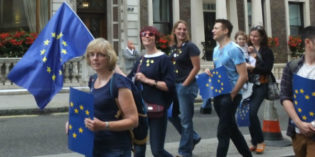Tag: Social media

Just how much do voters trust Scottish parties’ social media posts?
Do people believe the ‘facts’ circulated on social media by political parties? Graeme Baxter, Rita Marcella and Agnieszka Walicka showed Scottish voters five posts from different parties and asked them to rate their reliability. The Scottish Greens’ post was viewed as the most trustworthy, with participants identifying a wide gap between their experience of local politicians and the national debate. […]

Audit 2017: How far does the growth of social media extend or threaten democratic processes and values? Does it foster or impede greater citizen vigilance and control over government?
Social media technologies (such as blogging, Facebook, Twitter, Google, YouTube, Snapchat and Instagram) have brought about radical changes in how the media systems of liberal democracies operate. The platform providers have become powerful actors in the operation of the media system, and in how its links to political processes operate. Yet at the same time […]

The curious case of Britain First: wildly popular on Facebook, but a flop in elections
The far right party Britain First has enjoyed enormous success on Facebook. Yet it remains on the extreme fringe of mainstream politics, gaining only 1.2% of the vote in the London mayoral elections and not even contesting the 2017 General Election. What has driven its popularity on social media and what does the party intend […]

Trolling democracy: anonymity doesn’t cause conflicts, bad site design does
‘Don’t feed the trolls’, people on social media are told. By forcing people to use their real names online, the managers of online forums hope to shame trolls into silence. But, Jennifer Forestal argues, this fails to tackle the root of the problem: a lack of the ‘close and direct intercourse and attachment’ which John Dewey […]

A prison of our own design: divided democracy in the age of social media
Social media companies such as Facebook can sort us ever more efficiently into groups of the like-minded, creating echo chambers that amplify our views, writes Cass R Sunstein in an edited extract from #Republic: Divided Democracy in the Age of Social Media. It’s no accident that on some occasions, people of different political views cannot […]

In a divided Britain, the pro-EU movement will have to be clear about what it wants
The Brexit vote has thrown different conceptions of democracy into sharp relief. Some are horrified at the conduct of the referendum campaign; others see the result as the revealed will of the people. Luke Temple uses tweets from the March for Europe event on 3 September to show how these views clash. He concludes that the pro-EU movement needs a clear aim if […]

Review Roundtable: Naked Diplomacy: Power and Statecraft in the Digital Age by Tom Fletcher
What is the role of the diplomat in the digital age? In Naked Diplomacy: Power and Statecraft in the Digital Age, Tom Fletcher – former British ambassador to Lebanon and the youngest to be appointed in 200 years – draws upon his own experiences to outline a progressive vision of contemporary diplomacy that challenges top-down or one-way models […]

Towards a critical data science – the complicated relationship between data and the democratic project
What is driving the rise in data-driven techniques used by politicians and political campaigns to connect with the concerns and needs of citizens? Will a data-driven approach to political campaign messaging disrupt the “echo chamber” effect that is perceived to emerge within online spaces? Jo Bates finds the role of data science in the development of […]

Between the system and lifeworld: Despite adopting social media tools, public administrators remain in a legitimacy dilemma
Social media platforms theoretically align with many aspects of Habermas’ ideal of “authentic communication”. However, Claire Knox writes that this does not make them automatically applicable to public participation in governance structures. For example, while we see evidence of “cautious experimentation” among public administrators, there remains a lack of “institutional imagination” to maximise the democratic […]

Bland, predictable, and unrealistically positive: the Twitter use of candidates during the Scottish Parliament election
Graeme Baxter, Flora Barton and Caroline Hood give their initial impressions of how the parties and candidates used social media during the 2016 Scottish Parliament election campaign. Similar PostsJust how much do voters trust Scottish parties’ social media posts?Faced with an ‘infodemic’ of fake news about Covid-19, most people are checking their facts – but […]


 Democratic Audit's core funding is provided by the Joseph Rowntree Charitable Trust. Additional funding is provided by the London School of Economics.
Democratic Audit's core funding is provided by the Joseph Rowntree Charitable Trust. Additional funding is provided by the London School of Economics.